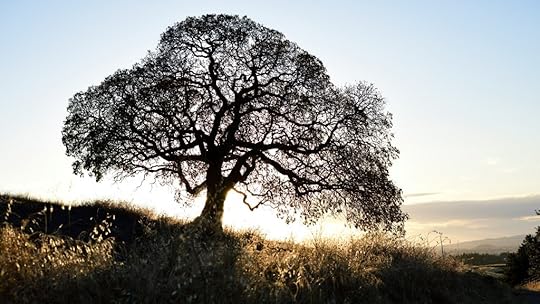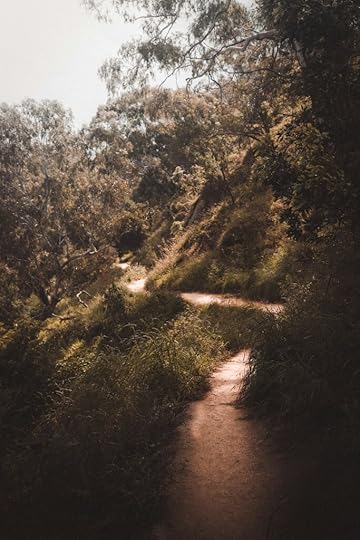Adam Fenner's Blog, page 36
May 21, 2024
Old Oak Tree


 View all responses
View all responsesNot a legacy of ashes, dust on the wind
Blackened remains on a metal sheet
Sprinkled on the water, children’s tears
Compost slowly, patience with grandpa
Consumed by earth, of fertile ground
Oak tree saplings, roots tangled deep
Let time pass, birds nest, squirrels play
Stretch wide, leaf burst cooling shade
Thick trunk fattens, generations forget
You know that tree there, and who it is?
Who? That old tree isn’t a who, its a tree?
That old tree was, my grandpa told me.
I’m on Facebook, there I’ll be able to communicate with people more directly, and also have more writing updates, beyond daily musings and light bits of poetry.

Photo by Mario Mesaglio on Unsplash
May 20, 2024
Winter


 View all responses
View all responsesWinter’s cycle
Season’s rest
A nap called
Hibernation
Garden relaxes
Yard work chills
Leaf fall exposes
Wandering deer
Cocoa comforts
Blankets wrap
I’m on Facebook, there I’ll be able to communicate with people more directly, and also have more writing updates, beyond daily musings and light bits of poetry.

Photo by Justin Kauffman on Unsplash
May 19, 2024
Cicada’s summer
Coemergent calls
Overwhelmed sky’s
Underworldly calls
Punched skyward
Progenitors’ flight
Earthbound ward
Whorling song
Fills bird bellies
Drowns birdsong
Amber carapace
Blood ruby eyes
It’s on my face!
I’m on Facebook, there I’ll be able to communicate with people more directly, and also have more writing updates, beyond daily musings and light bits of poetry.

Photo by Shannon Potter on Unsplash
Invitation – Share your pages here


 View all responses
View all responsesThis prompt is a bit, meh.
If you want to share a link to your page, and a brief description of what your page is about I’m inviting it. Don’t be spammy, but if you do, that is your loss. I’d imagine in an age of oversaturation people are cautious to click random links. Make it interesting.
For myself.
I’m on Facebook, there I’ll be able to communicate with people more directly, and also have more writing updates, beyond daily musings and light bits of poetry.

Photo by eberhard  grossgasteiger on Unsplash
grossgasteiger on Unsplash
May 18, 2024
Balanced responsibilities


 View all responses
View all responsesBalanced responsibilities
Gracefully considered
Work Family
Fleeting childhood
Quiet evenings
Shared Meals
Hey Dad!
Balanced on the head of a sledgehammer
Inflation
Hidden fees
Credit card debt
Interest rate hikes
How much for milk?
Rising mortgage rate
One last work request
I’m on Facebook, there I’ll be able to communicate with people more directly, and also have more writing updates, beyond daily musings and light bits of poetry.

Photo by Jonny Gios on Unsplash
May 17, 2024
Small sacrifices


 View all responses
View all responsesTheatrical distractions
Grand sacrifices
Make great stories
Lifestyle construction
Micro sacrifices a
Forgettable exchange
Technical competency
Time to study or
Hours of entertainment
Career opportunities
Extra hours or
Punching the clock
Healthy life, long lived
Sensible dinner or
Deliciously processed
Surrounded by family
Precious moments or
Friday poker night
Sacrifices accumulate
Small choices
Large exchanges
I’m on Facebook, there I’ll be able to communicate with people more directly, and also have more writing updates, beyond daily musings and light bits of poetry.

Photo by Tyler Milligan on Unsplash
May 16, 2024
These old things?


 View all responses
View all responsesA bit old, to worry about
What I’m wearing about
Enough to cover the bits
Warm and dry for a bit
Trying to better blend in
Avoid the crowd, not fit in
Costly game, shopping bags
Too much expected of rags
I’m on Facebook, there I’ll be able to communicate with people more directly, and also have more writing updates, beyond daily musings and light bits of poetry.

Photo by Keagan Henman on Unsplash
May 15, 2024
A Choice


 View all responses
View all responsesLeadership or followership
A choice or an inheritance
Choose to bear the mantle
Choose to serve the crowd
Accept the crowded places
Accept the greater goods
Weights of responsibility
Or burden of acceptance
I’m on Facebook, there I’ll be able to communicate with people more directly, and also have more writing updates, beyond daily musings and light bits of poetry.

Photo by Jehyun Sung on Unsplash
May 14, 2024
Yawn.


 View all responses
View all responsesWhat a strange prompt.
That is all, nothing more.
I’m on Facebook, there I’ll be able to communicate with people more directly, and also have more writing updates, beyond daily musings and light bits of poetry.

Photo by Markus Spiske on Unsplash
May 13, 2024
Add them up


 View all responses
View all responsesTake small steps to
Make small changes
Minor improvements
Accumulate upgrades
Eat more vegetables
More physical activity
Socialize, in person
Without your device
One small change
One each week
Fifty two weeks
Lots of changes

Photo by Pat Whelen on Unsplash
I’m on Facebook, there I’ll be able to communicate with people more directly, and also have more writing updates, beyond daily musings and light bits of poetry.



